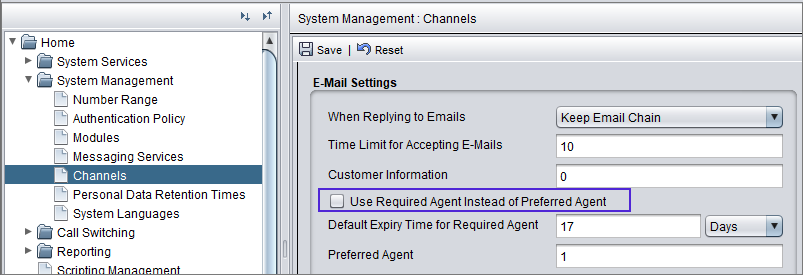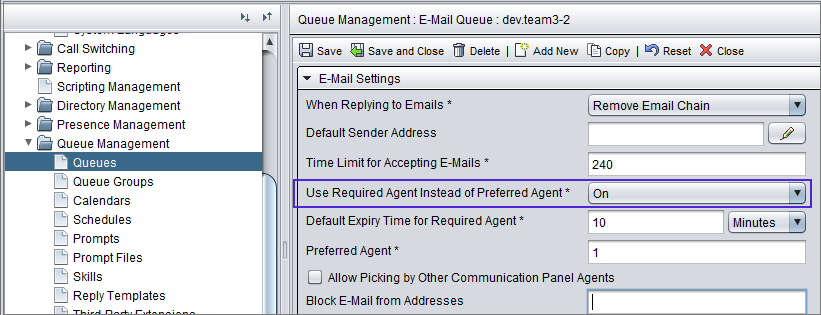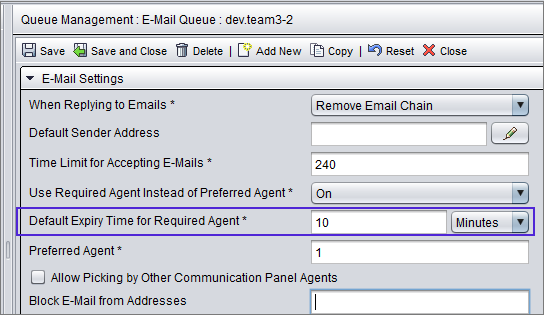Required Agent
The required agent function is firmer requirement than the preferred agent function. When a conversation has a required agent, the system waits when this agent is available for receiving conversations and only then allocates the conversation. You define the expiry time for the required agent, and when the time has elapsed, the conversation can be allocated to any agent serving in the queue.

Social Chats
The image below shows what you need for defining a required agent or several required agents for social chats.

-
Set up Chatlayer, Conversation API, and the third-party CRM system.
-
If you want that other Communication Panel agents can pick the social chat that has a required agent requirement, go to and enable the setting Allow Picking Chats from Preferred/Required Agents.

-
Define the required agent(s) and the waiting time in the request before it's sent to Sinch Contact Pro.

Emails
-
Depending on whether you want to define the required agent function for all email conversations in your system or for a specific queue, go to

or

-
For the setting Use Required Agent Instead of Preferred Agent choose On.
-
Make sure that the setting Preferred Agent is also enabled. Otherwise the required agent function doesn't work.
-
Define the expiry time either in channel or queue settings.
Table 1. Setting Description Default Expiry Time for Required Agent
Define how long the required agent requirement is valid. After the required agent requriment has expired, the conversation can also be allocated to other agents. The default value is 1 week.

-
If you want that other Communication Panel agents can pick the email that has a required agent requirement, select the setting Allow Picking by Other Communication Panel Agents.
Tasks
In systems, where tasks arrive to the email queue from the Restful Task Management Interface (RTI) or Task Management Interface (TMI) interface, you can define a required agent for the task, and a waiting time for this requirement. If the required agent is defined for the task, only the defined agent can receive the task. After the expiry time, the task is available for all agents in the queue.
The required agent is defined in the RTI/TMI interface. The tasks can be TMI tasks (type TASK), CP tasks (type XRI), e-mails (type EMAIL) or action items (type ACTION), the queue can be defined either by GUID or name, or email address, and the agent either by GUID, or user name. For more information, see the Sinch Contact Pro Task Management Interface document.
- Go to
- For the setting Use Required Agent Instead of Preferred
Agent choose On.
If this is not enabled, the required agent for a task is considered a preferred agent.
- Define the expiry time either in channel or queue settings.
Table 2. Setting Description Default Expiry Time for Required Agent
Define how long the required agent requirement is valid. After the required agent requriment has expired, the conversation can also be allocated to other agents. The default value is 1 week.
Conversation Routing with Required Agent and Preferred Agent Functions
The following table shows how these functions affect conversation routing.|
Source |
Required Agent in Request |
Preferred Agent Setting in SC |
Is There a Preferred Agent for Conversation? |
Use Required Agent Instead of Preferred Agent Setting in SC |
Routing Method |
|---|---|---|---|---|---|
|
Conversation API |
Yes |
- |
No |
- |
The required agent routing is used. |
|
Conversation API |
No |
-1 |
No |
- |
The conversation is routed to any free agent. |
|
Conversation API |
No |
-1 |
Yes |
- |
The preferred agent routing is used. |
|
IMAP |
- |
Off |
- |
Off |
The conversation is routed to any free agent. |
|
IMAP |
- |
Off |
- |
On |
The conversation is routed to any free agent. |
|
IMAP |
- |
On |
No |
Off |
The conversation is routed to any free agent. |
|
IMAP |
- |
On |
No |
On |
The conversation is routed to any free agent. |
|
IMAP |
- |
On |
Yes |
Off |
The preferred agent routing is used. |
|
IMAP |
- |
On |
Yes |
On |
The required agent routing is used. The preferred agent routing is not used even if none of the required conversation accepts the contact within the expiry time. |
|
XRI and TMI |
No |
Off |
- |
- |
The conversation is routed to any free agent. |
|
XRI and TMI |
No |
On |
No |
- |
The conversation is routed to any free agent. |
|
XRI and TMI |
No |
On |
Yes |
Off |
The preferred agent routing is used. |
|
XRI and TMI |
No |
On |
Yes |
On |
The required agent routing is used. |
|
XRI and TMI |
Yes |
Off |
- |
- |
The required agent routing is used. |
|
XRI and TMI |
Yes |
On |
No |
- |
The required agent routing is used. |
|
XRI and TMI |
Yes |
On |
Yes |
Off |
The required agent routing with the agents defined in the SOAP or REST request is used. If none of the required agents accepts the offered conversation within the expiry time, then the preferred agent routing is used. |
|
XRI and TMI |
Yes |
On |
Yes |
On |
The required agent routing with the agents defined in the SOAP or REST request is used. |
